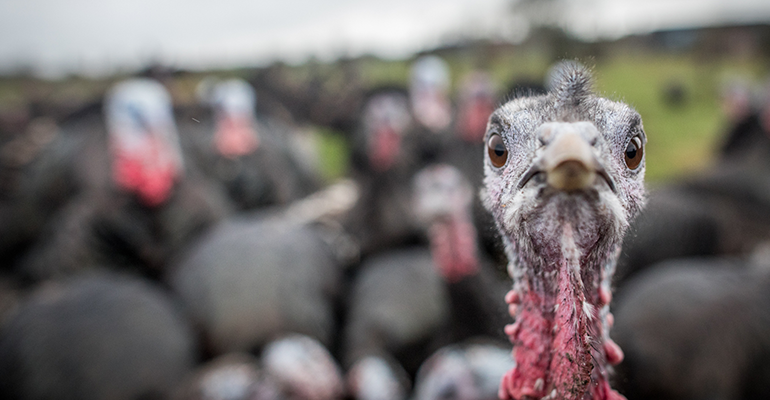News
Diestel is first turkey producer to snag Regenifed certification
17 Sep 2024In the US, Diestel Family Ranch, a family-owned turkey farming venture, has become the first producer to gain Regenified certification for its whole turkey and processed turkey product ranges.
The Regenified seal is the first third-party regenerative farming programme to be recognised by the United States Department of Agriculture (USDA) Food Safety and Inspection Services. The certification programme aims to champion regenerative farming practices across the United States and Canada.

Regenerative farming has gained significant impetus across the global agricultural industry over the past decade, mainly because it employs simple and natural techniques to enhance soil, crop, and animal health, with the ultimate aim of making farms more productive in the long-term.
Diestel is a fourth-generation ranch turkey farming venture and in 1999 it became one of the first poultry farmers in the Nation to adopt organic practices. Building on its sustainable reputation, the business took on the challenge of fulfilling the Regenified 6-3-4 Standard, which began with the sourcing of 650 tonnes of Regenified certified corn, in the spring of this year.
Diestel started to introduce regenerative measures in spring of 2024
Beyond this, the certification has to meet standards based on six principles, three rules and four processes, which include getting soil health right, adaptive stewardship to ensure the right practices are implemented and specific ecosystem processes that must be applied to 40 – 60% of the agricultural farm land.
“The Regenified certification is an important recognition of what has always differentiated Diestel: holistic farming practices that prioritise the turkeys on our farm and the land where they are raised.
“We’re proud to receive this certification, which we believe marks another important milestone to lead the poultry industry forward,” said Heidi Diestel, fourth-generation farmer at Diestel Family Ranch.
Heidi Diestel added that the seal will be used on the future packaging of certified bird products and that the information about the certification process is being disseminated both on the company’s website and through social media.
“To achieve certification, we had to meet Regenified’s rigorous 6-3-4 Standards which include soil health, adaptive stewardship, and ecosystem processes. With their support, Regenified will help us track our progress in advancing regenerative principles to improve biodiversity, soil health, water quality, and nutrient density. We plan to continue and expand these practices over time,” Heidi Diestel explained
Compost, planting trees, and probiotics all play a part
As well as using regeneratively sourced corn feed, the company has also taken measures to ensure a natural habitat for the birds, which includes the ability for them to roam and seek shade from nearby trees. With this in mind, the company has planted over two miles of evergreen perennial shrubs, to both provide enhanced protection for the birds and improve the ranch’s ecosystem.
To improve the quality of the soil—an integral part of regenerative farming—, the company has chosen to turn its organic waste into nutrient-intense compost, redirecting over 2,000 tonnes of waste that otherwise would have gone to landfill, which instead ends up providing around 6,350 tonnes of compost that helps enrich the soil’s microbiology.
Avoiding unnecessary chemicals is another important element in gaining the certification, and one that has led Diestel to use probiotics in the birds’ feed to eliminate the need for traditional chemicals such as chlorine. This helps to enhance the health of the flock naturally, without negatively impacting the ecosystem.
"Diestel is leading the industry into the future," said Salar Shemirani, CEO of Regenified. "Their commitment to regenerative agriculture extends beyond the farm and the environment, positively impacting the entire supply chain through off-farm purchases of regenerative feed."
Related news

Value is a top priority for today’s F&B consumers
3 Apr 2025
Research from global consultancy Hartman Group suggests there are six core values that brands must tap into to connect with consumers’ needs.
Read more
Make plant-based meat ‘tastier and more affordable’ to fight climate change
31 Mar 2025
The UK’s Climate Change Committee is calling for tastier, more affordable plant-based meat offerings as part of measures to counteract the nation’s environmental impact.
Read more
Clean-label cereals prompt fortification debate
28 Mar 2025
Marks & Spencer has caused a stir with the launch of a range of breakfast cereals in the UK containing minimal ingredients.
Read more
UK consumers could be eating cultivated meat within two years
26 Mar 2025
Cell-cultivated products (CCPs), from chicken nuggets to beefburgers, could be on UK supermarket shelves by 2027 after regulators launched a sandbox to accelerate approvals.
Read more
Future F&B flavours favour exploration and explosive taste profiles
25 Mar 2025
Exploration and experimentation will define the future of flavour, according to Mintel, as consumers seek out taste profiles and textures that offer an adventurous eating experience.
Read more
‘Health’ labels on products reduce consumers’ willingness to pay
10 Mar 2025
A study into front-of-packaging “health” labelling finds that these labels alone can lower US consumers’ willingness to pay.
Read more
Food industry lags on healthier product formulation, nutrition index finds
7 Mar 2025
The world’s biggest food manufacturers derive just 34% of their sales from healthier products, according to the 2024 Global Access to Nutrition Index.
Read more
Does calorie labelling lead to reduced consumption?
27 Feb 2025
Calorie labelling of food products leads to a small, but consistent, reduction in the number of calories consumed, a study suggests.
Read more
F&B industry hit with fresh greenwashing claims
26 Feb 2025
The food and beverage (F&B) industry is under fresh scrutiny amid claims of greenwashing, with Arla the latest company in the firing line.
Read more
Have scientists discovered a new tool to measure UPFs?
19 Feb 2025
Researchers have developed a new scoring system and database, compiling over 50,000 food items, of which over 1,000 are classified as ultra-processed.
Read more